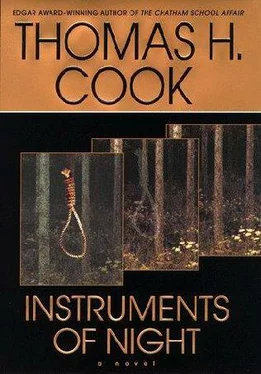Thomas Cook - Instruments of Night
Здесь есть возможность читать онлайн «Thomas Cook - Instruments of Night» весь текст электронной книги совершенно бесплатно (целиком полную версию без сокращений). В некоторых случаях можно слушать аудио, скачать через торрент в формате fb2 и присутствует краткое содержание. Жанр: Триллер, на английском языке. Описание произведения, (предисловие) а так же отзывы посетителей доступны на портале библиотеки ЛибКат.
- Название:Instruments of Night
- Автор:
- Жанр:
- Год:неизвестен
- ISBN:нет данных
- Рейтинг книги:3 / 5. Голосов: 1
-
Избранное:Добавить в избранное
- Отзывы:
-
Ваша оценка:
- 60
- 1
- 2
- 3
- 4
- 5
Instruments of Night: краткое содержание, описание и аннотация
Предлагаем к чтению аннотацию, описание, краткое содержание или предисловие (зависит от того, что написал сам автор книги «Instruments of Night»). Если вы не нашли необходимую информацию о книге — напишите в комментариях, мы постараемся отыскать её.
Instruments of Night — читать онлайн бесплатно полную книгу (весь текст) целиком
Ниже представлен текст книги, разбитый по страницам. Система сохранения места последней прочитанной страницы, позволяет с удобством читать онлайн бесплатно книгу «Instruments of Night», без необходимости каждый раз заново искать на чём Вы остановились. Поставьте закладку, и сможете в любой момент перейти на страницу, на которой закончили чтение.
Интервал:
Закладка:
EDWARD: Mona is a student. Nursing school.
From there, Portman had gone on to question Mona Flagg about her activities on August 27. Her answers added little to what Edward had already said. She’d joined Edward for breakfast at 7:30 A.M., she said. After breakfast, she’d later returned briefly to her room, dressed for a sail, and headed for the basement, arriving there at approximately 8:25. From there she’d walked through the connecting corridor to the boathouse, where Edward was preparing the boat. As to the sailing trip that had immediately followed, Mona gave few additional details, save that they’d picnicked on the bank of the river, and that on the return trip they’d helped a fisherman untangle his line.
PORTMAN: Do you remember this fisherman’s name?
MONA: No.
EDWARD: His name is Jamison. Harry Jamison. He lives at PORTMAN: I know where Harry lives.
Graves heard Portman’s voice as abrupt and almost combative, the kind of response Slovak made when he wanted to make the point that he was not a fool. But would Portman actually have replied in that way? Graves considered it a moment, then decided that he would have. For it had been a long day, and he’d uncovered little useful information. Even more significant, Graves felt sure that Portman had begun to suspect that his way was being blocked, though he did not yet know why.
PORTMAN: Did you know Faye Harrison very well?
EDWARD: I knew Faye somewhat. We weren’t exactly friends. But she has lived at Riverwood all her life so PORTMAN: How about you, Miss Flagg?
MONA: We sailed on the pond a few times. Talked and PORTMAN: What did you talk about?
MONA: She was interested in what I was learning in school. We talked about that. Medicine.
PORTMAN: What about personal things?
MONA: No. We didn’t talk about personal things.
Having reached another dead end, Portman shifted to a different area of inquiry. Not what either Edward or Mona might or might not have known about Faye’s life, but their physical whereabouts when it had abruptly ended.
PORTMAN: You said that you went for a picnic during the afternoon?
MONA: Yes, we did.
PORTMAN: On the riverbank?
EDWARD: Yes.
PORTMAN: Did you sail up the northern or southern bank of the river?
EDWARD: Mostly along the northern one.
PORTMAN: Do you know where Manitou Cave is?
EDWARD: Vaguely.
PORTMAN: Did you see anyone on the shore around that area?
EDWARD: Not that I recall.
PORTMAN: Where did you and Miss Flagg go ashore for your picnic?
EDWARD: Granger Point.
PORTMAN: Did anybody see you there?
EDWARD: Some boats passed by on the river. I suppose they saw us. I remember waving at one of them.
PORTMAN: How long did your picnic last?
EDWARD: All afternoon.
PORTMAN: Then what?
EDWARD: Then Mona and I sailed back down the river.
Portman worked to eke out a few more details, once again tracing the route the two had taken upriver, this time almost inch by inch. But he’d finally given up and shifted his focus to the trip back to Riverwood.
PORTMAN: When did you head home?
EDWARD: That would have been about six or so.
PORTMAN: Which side of the river?
EDWARD: More or less the middle. As we got closer, we sailed toward the northern shore.
PORTMAN: Did you see anything that looked suspicious?
EDWARD: No.
PORTMAN: How about you, Miss Flagg? Anything at all. Someone standing on the riverbank or walking in the woods? Anything.
MONA: I saw other boats. But nothing onshore.
Once back at Riverwood, Edward and Mona had each returned to their respective rooms, where they’d remained until dinner. At the end of the meal, the whole family, along with Andre Grossman, had gathered on the side porch, as Edward said, “to take in the night air.”
Had Portman ever taken the time to imagine that particular evening at Riverwood, Graves wondered. Imagine it, as Graves himself now did. Edward’s small boat drifting up the channel. Mona seated at its starboard end, the frilly umbrella she’d earlier used to block the morning sun now folded in and tucked beneath her seat. The whole family later gathered around a long dining table, then assembled on the porch to enjoy the scented warmth of a summer night. In his mind Graves saw Warren Davies light a cigar. Its tip glowed brightly in the darkness. As for the others, he imagined Edward and Mona in the swing, Mrs. Davies on the wicker settee, Andre Grossman in the rocker beside her, Allison curled up in a chair a few feet away, still lost in her book. From the evidence he’d so far reviewed, Graves could only assume that none of them had yet learned that Faye had not returned home that night, nor had any idea that at that very moment her body lay sprawled across the ever-darkening floor of Manitou Cave. Instead, they’d felt only the peace of the night, heard only the lulling waters of the nearby channel. Perhaps Mr. Davies had commented upon his earlier meeting with the local mayor. Or perhaps the conversation had moved toward art, Grossman speaking learnedly of the great portraitists he admired.
Regardless of the nature of their conversation, it had been abruptly broken off, as Portman’s final questions made clear.
PORTMAN: When did you hear that Faye Harrison was missing?
EDWARD: That same evening. Around nine. We were all on the side porch when Mrs. Harrison came to the door. She spoke to one of the servants.
PORTMAN: Which one?
EDWARD: Greta Klein. She is a PORTMAN: Refugee.
EDWARD: Well… yes, I suppose you could say that.
PORTMAN: When the sheriff came here the day after Faye disappeared, he didn’t talk to her.
EDWARD: That’s because she wasn’t here. She has a nervous condition of some sort. She left Riverwood the morning after we heard about Faye. She’s back now. Poor thing. She’s suffered so much.
Suffered so much. Portman had written those very words in his notebook, then underlined them, as if he were drawn to suffering the way Slovak was, saw it etched in every face, its ravages unavoidable and inherent, “the Unmoved Mover in the life of man.”
If that were so, Graves thought, then Portman would have sought out Greta Klein immediately.
He turned the page in the detective’s notebook, and saw that he had done precisely that.
In the end, however, the meeting had come to very little. Portman had found Greta in her tiny upstairs room, questioned her extensively. But the interview had proven no more useful than any of the others Portman had conducted that day. In general, Greta had confirmed what Portman had already been told by others on the estate. Certainly she had not moved Portman’s investigation further in any significant way.
Greta had added a single, curious detail, however, one that must have edged Portman’s inquiry toward a new direction, sent new questions whirling through the old detective’s mind: Why, on the day of her death, had Faye Harrison secretly entered the basement of the Davies house? What, in that gray light, had she been looking for?
As Portman’s notes made clear, Greta Klein had not been able to answer any of these questions fifty years before. Graves wondered if she might be able to do so now.
CHAPTER 18
It was the same middle-aged woman he’d so often encountered before who directed Graves to Greta Klein’s room.
“It’s time you learned my name,” the woman said as Graves approached her. “Mrs. Alice Powers.” She smiled. “I hear you’re working on a history of Riverwood.”
“Well, not exactly a history,” Graves said. “A murder.”
Her features stiffened. “You mean of that girl? Back in the forties?”
Graves nodded. “Greta Klein was here then.”
Mrs. Powers’ features remained taut. “And Mr. Saunders. They sometimes sit together and talk about the old days.”
Читать дальшеИнтервал:
Закладка:
Похожие книги на «Instruments of Night»
Представляем Вашему вниманию похожие книги на «Instruments of Night» списком для выбора. Мы отобрали схожую по названию и смыслу литературу в надежде предоставить читателям больше вариантов отыскать новые, интересные, ещё непрочитанные произведения.
Обсуждение, отзывы о книге «Instruments of Night» и просто собственные мнения читателей. Оставьте ваши комментарии, напишите, что Вы думаете о произведении, его смысле или главных героях. Укажите что конкретно понравилось, а что нет, и почему Вы так считаете.












